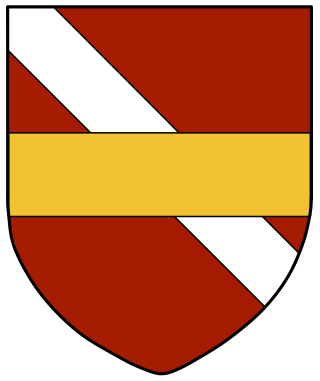Osbern is a given name. Variants include Osbearn and Osbarn.
Notable people with the name include:

William FitzOsbern, 1st Earl of Hereford, Lord of Breteuil, was a relative and close counsellor of William the Conqueror and one of the great magnates of early Norman England. FitzOsbern was created Earl of Hereford in 1067, one of the first peerage titles in the English peerage. He is one of the very few proven companions of William the Conqueror known to have fought at the Battle of Hastings in 1066. His chief residence was Carisbrooke Castle on the Isle of Wight, one of many castles he built in England.
Osbert is a male Germanic given name and a surname, composed of the elements ans/os "god", and berht "bright".

William the Conqueror had men of diverse standing and origins under his command at the Battle of Hastings in 1066. With these and other men he went on in the five succeeding years to conduct the Harrying of the North and complete the Norman conquest of England.
Osbern FitzOsbern was a Norman churchman. He was a relative of King Edward the Confessor as well as being a royal chaplain. During Edward's reign he received the church at Bosham, near Chichester. He was present at the consecration of Westminster Abbey at Christmas 1065. He was a steward for King William I of England during his reign, as well as being a friend of the king. The story that he became William's chancellor is based entirely on a charter that modern historians have declared mostly spurious. He became Bishop of Exeter in 1072, and was consecrated at St. Paul's in London on 27 May 1072 by the Archbishop of Canterbury, Lanfranc.
Events from the 1190s in England.
Fitzmaurice is a Hiberno-Norman, Cambro-Norman, Anglo-Norman surname. It is patronymic as the prefix Fitz-
derives from the Latin filius, meaning "son of".
Fitzgilbert is a Norman French surname. It is patronymic, since the prefix Fitz- derives from the Latin filius, meaning "son of." Its variants include the alternate forms FitzGilbert, Fitz Gilbert, Fitz-Gilbert, fitz Gilbert, and the given name turned surname Gilbert or Gilberts. Fitzgilbert is rare as a given name. People with the name include:
Fitzrichard is a Hiberno-Norman surname. It is patronymic as the prefix Fitz- derives from the Latin filius, meaning "son of". Its variants include the alternate forms FitzRichard, fitz Richard and Fitz Richard, and the given name turned surname Richard or Richards. Fitzrichard is rare as a given name. People with the name Fitzrichard include the brothers:
Fitzstephen is an English language Hiberno-Norman surname. It is patronymic as the prefix Fitz- derives from the Old French filz, itself from Latin filius, meaning "son of". Its variants include FitzStephen, Fitz Stephen, Fitz-Stephen; alternate spelling Fitzstephens ; and the given name turned surname Stephen. Fitzstephen is rare as a given name. People with the name Fitzstephen include:
Fitz was a patronymic indicator used in Anglo-Norman England to help distinguish individuals by identifying their immediate predecessors. Meaning "son of", it would precede the father's forename, or less commonly a title held by the father. In rare cases, it formed part of a matronymic to associate the bearer with a more prominent mother. Convention among modern historians is to represent the word as fitz, but in the original Norman French documentation, it appears as fiz, filz, or similar forms, deriving from the Old French noun filz, fiz, meaning "son of", and ultimately from Latin filius (son). Its use during the period of English surname adoption led to its incorporation into patronymic surnames, and at later periods this form was adopted by English kings for the surnames given some of their recognized illegitimate children, and by Irish families when anglicizing their Gaelic patronymic surnames.

FitzAlan is an English patronymic surname of Anglo-Norman origin, descending from the Breton knight Alan fitz Flaad, who accompanied king Henry I to England on his succession. He was grandson of the Seneschal of the Bishop of Dol. The FitzAlan family shared a common patrilineal ancestry with the House of Stuart.

The House of Tosny was an important noble family in 10th and 11th century Normandy, though it did not include any comtes or vicomtes. Its founder was Raoul I of Tosny.

Carisbrooke Priory was an alien priory, a dependency of Lyre Abbey in Normandy. The priory was situated on rising ground on the outskirts of Carisbrooke close to Newport on the Isle of Wight. This priory was dissolved in around 1415.
Galfrid or Galfred is an Anglo-Norman variant of the name Geoffrey. It derives, like German Gottfried, from Old High German Godafrid, Old French Godefroy, and Old Norse Guðfriðr, meaning 'God's peace' or 'good protection', depending upon etymological interpretation. Variants, also used as synonymous with Gottfried, include Italian Goffredo and Middle French Gaufredi. The name is etymologically unrelated to, but was historically used interchangeably with, Welsh Gruffudd or Gruffydd in Wales.
Steward is an English occupational surname.
Osborne, along with Osbourne, Osbern, Osborn and Usborne, is an English name cognate with, and possibly influenced by the Old Norse Ásbjørn. The English Os and the Norse Ás mean God, while bjørn means bear in Norse.
Osbern the Steward, known in French as Osbern de Crépon, was the Steward of two Dukes of Normandy and the father of William FitzOsbern, 1st Earl of Hereford, one of William the Conqueror's closest counsellors.
Henry le Scrope, 1st Baron Scrope of Masham was an English soldier and administrator.
Withenoc or Guihenoc de La Boussac was a nobleman and monk of Breton origin, who was lord of Monmouth between 1075 and 1082 and was responsible for founding the Priory at Monmouth.
Osbern fitzRichard was a Frenchman, perhaps Norman, who was a landowner and tenant-in-chief in England. Osbern served as a royal judge and sided with the baronial rebels at the start of King William II's reign, although he later returned to the king's service.